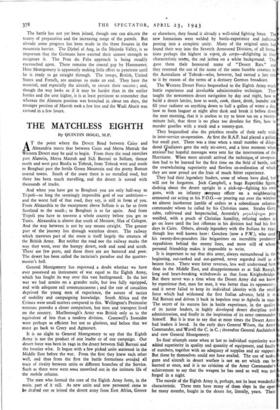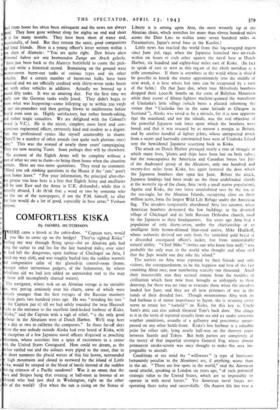THE MATCHLESS EIGHTH
By QUINTIN 1106G, M.P.
AT the point where the Desert Road between Cairo and Alexandria meets that between Cairo and Mersa Matruh the Western Desert may be said to begin. From there the road stretches past Alamein, Mersa Matruh and Sidi Barrani to Sollum, thence north and west past Bardia to Tobruk, from Tobruk west and south to Benghazi past the fertile Green Mountain and the pretty Roman coastal towns. South of the coast there is no metalled road, but there has been much travelling, and the desert is scored with thousands of tracks.
And when you have got to Benghazi you are only half-way to Tripoli—so long the seemingly impossible goal of our ambitions— and the worst half of that road, they say, is still in frost of you. From Alexandria to the escarpment above Sollum is as far as from Scotland to the south ; to Benghazi is as far again. And from Tripoli you have to traverse a whole country before you get to Tunis. Alexandria is almost due south of Moscow, Sfax of Cologne. And the way between is not by any means straight. The greater part of the journey lies through waterless desert. The railway which traverses part of the route is itself largely the creature of the British Army. But neither the road nor the railway marks the way they went, over the bumpy desert, rock and sand and scrub. There arc few ports, and those there are are battered and poor. The desert has been called the tactician's paradise and the quarter- master's hell.
General Montgomery has expressed a doubt whether we have ever possessed an instrument of war equal to the Eighth Army, which has fought its way over this vast battleground. In the last war we had armies on a grander scale, but less fully equipped, and with adequate rail communications ; and the rate of casualties deprived the young men of experience, the nature of tactics of mobility and campaigning knowledge. South Africa and the Crimea were small matters compared to this. Wellington's Peninsular veterans provoke a closer comparison, but men and transport lived on the country. Marlborough's Army was British only as to the equivalent of less than a modern division. Cromwell's Ironsides were perhaps as efficient but not so glorious, and before that we must go back to Crecy and Agincourt.
It is no slight to General Montgomery to say that the Eighth Army is not the product of one leader or of one campaign. Our desert force was born in 1940 in the desert between Sidi Barrani and the frontier wire. It began with a few picked units stationed in the Middle East before the war. From the first they knew each other well, and thus from the first the battle formations avoided all trace of rivalry between units or different branches of the Service. Such as there were were soon smoothed out in the intimate life of the mobile column.
The men who formed the core of the Eighth Army form, in the main, part of it still. As new units and new personnel came to be drafted out or joined the desert army from East Africa, Greece
or elsewhere, they found it already a well-tried fighting force. The new formations were welded by battle-experience and judicious posting into a complete unity. Many of the original units had found their way into the Seventh Armoured Division, of all forma- tions perhaps the highest in esprit, de corps—delighting in their characteristic totem, the red jerboa on a white background. This gave them their honoured name of "Desert Rats." and they resented the use of the name of the same humble creature be the Australians of Tobruk—who, however, had earned a just title to it by reason of the terms of a derisory German broadcast.
The Western Desert Force bequeathed to the Eighth Army much battle experience and invaluable administrative technique. They taught the newcomers desert navigation by day and night, how to build a desert latrine, how to wash, cook, shave, drink, launder and fill your radiator on anything down to half a gallon of water a day, how to form leaguer at night after dusk and break it before dawn the next morning, that it is useless to try to brew tea on a twenty- minute halt, that there is no place too desolate for flies, how to murder gazelles with a truck and a tommy-gun.
They bequeathed also the priceless results of their early trials in inter-service co-operation. At first the R.A.F. had played a gallant but small part. There was a time when a small number of dilapi- dated Gladiators gave the only air-cover, and a later moment when anxious but hopeful messages were sent for the intervention of the Hurricane. When more aircraft arrived the technique. of co-opera- tion had to be learned for the first time on the field of battle, and (1 the overwhelming superiority and flawless co-ordination of which they are now proud are the fruit of much bitter experience.
They had their_legendary leaders, some of whom have died, but will not be forgotten. Jock Campbell, a huge Rupertlike figure, dashing about the desert upright in a pick-up--fighting his own guns, with an infantry csampany officer on a neighbouring armoured car acting as his F.O.O.—or pouring out over the wireless an almost incoherent jumble of orders to a subordinate column- commander whom he called by his Christian name. Strafer Gott, calm, cultivated and bespectacled, Aristotle's ii(7aA41G,,xoc per- sonified, with a touch of Christian humility, refusing orders to go on leave until the last rifleman in his division had had his five days in Cairo. Others, already legendary with the Italians by 1941, though less well known here: Goschen (now a P.W.), who used his twenty-five-pounders like brigantines on incredible predatory expeditions behind the enemy lines, and more still of whom 3 personal friendship makes it impossible to write.
It is important to say that this army, always outnumbered in the beginning, out-tanked and out-gunned, never regarded itself as a beaten force. There were bitter reverses, less well understood here than in the Middle East, and disappointments as at Sidi Rezegh, long and heart-breaking withdrawals as that from Knightsbridge. But there never was a time when the Desert Army did not know by experience that, man for man, it was better than its opponents ; and it never failed to keep its individual identity with the small force which had withstood the first Italian advance, held it at Sid Barrani and driven it back in hopeless rout to Agheila in 194o. The secret of its success lies in battle experience, in the quality of its junior leaders, in highly developed desert discipline and administration, and finally in the inspiration of its army commander himself. But it is true to say that at most times the Desert Army had leaders it loved. In the early days General Wilson, the Army Commander, and Wavell the C. in C. ; thereafter General Auchinleck and now General Montgomery.
Its final triumph came when at last to individual superiority was added superiority in quality and quantity of equipment, and finally of numbers, together with an adequacy of supplies and air support. But these by themselves could not have availed. The use of tanks. guns and aircraft in desert warfare is not an art which can be learned at once, and it is no criticism of the Army Commander's achievement to say that the weapon he has used so well was not forged in a night.
The morale of the Eighth Army is, perhaps, not its least wonderful characteristic. These men have many of them slept in the open for many months, fought in the desert for, literally, years. Their Rad from home has often been infrequent and the news not always ood. They have gone without sleep for nights on end and short f it for many months. They have been short of water and, -casionally, of food. But they remain the same, good companions nd loyal friends. Here is a young officer's letter written within a rw days of Alamein: "You are quite right. Den bOsen alien Rommel haben wir mit brennenden Zunge am Arsch gelecht. have just been back to the Alamein battlefield to count the pick- p and write a historical record. Remaining on the ground were wenty-seven burnt-out tanks of various types and six other chides. But a certain number of burnt-out hulks have been moved and we are officially credited with thirty-seven tanks burnt hit with other vehicles in addition. Actually we brassed up a und fifty tanks. It was an amazing day. For the first time we tally saw the German tanks really foxed. They didn't begin to now what was happening—came lolloping up to within zoo yards our six-pounders and then getting blown to smithereens before ey'd even seen us. Highly satisfactory, but rather breath-taking, rid rather tragic casualties. We are delighted with the Colonel's ward (a V.C.). He is the nicest, simplest, most loyal and con- ientious regimental officer, extremely kind and modest to a degree. 'uts the professional cynics like myself unutterably to shame. 'betel be a number of other awards (not quite such glorious ones) ter." This was the reward of nearly three years' campaigning. they are now nearing Tunis. Soon perhaps they will be elsewhere. No account of the Eighth Army will be complete without a ote of what we owe to them—to bring them home when the situation ermits. Here are two more quotations. They need no comment. Mind you ask stinking questions in the House if the ' rats' aren't even home leave." "For your information, the principal after-the- rar grouse you hear here is a fear that Eighth Army and ancillaries ill be sent East and the Army in U.K. disbanded ; while that is atently absurd, I do th'nk that a word or two by someone who as the ear of the newspapers, if not the P.M. himself, to allay at fear would do a lot of good, especially in base areas." Verbum pienti.



























 Previous page
Previous page